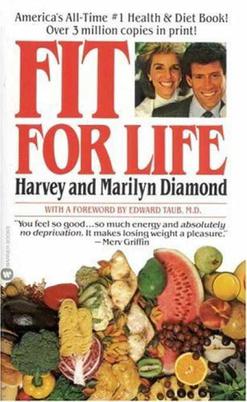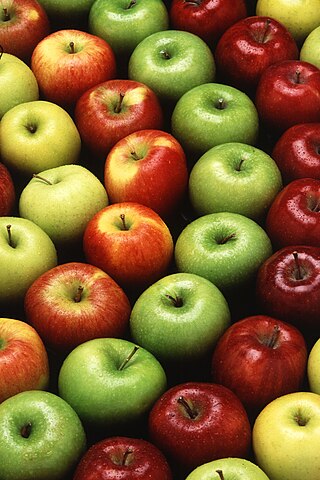Dieting is the practice of eating food in a regulated way to decrease, maintain, or increase body weight, or to prevent and treat diseases such as diabetes and obesity. As weight loss depends on calorie intake, different kinds of calorie-reduced diets, such as those emphasising particular macronutrients, have been shown to be no more effective than one another. As weight regain is common, diet success is best predicted by long-term adherence. Regardless, the outcome of a diet can vary widely depending on the individual.

A food pyramid is a representation of the optimal number of servings to be eaten each day from each of the basic food groups. The first pyramid was published in Sweden in 1974. The 1992 pyramid introduced by the United States Department of Agriculture (USDA) was called the "Food Guide Pyramid" or "Eating Right Pyramid". It was updated in 2005 to "MyPyramid", and then it was replaced by "MyPlate" in 2011.

Joel Fuhrman is an American celebrity doctor who advocates a plant-based diet termed the "nutritarian" diet which emphasizes nutrient-dense foods. His practice is based on his nutrition-based approach to obesity and chronic disease, as well as promoting his products and books. He has written books promoting his dietary approaches including the bestsellers Eat to Live, Super Immunity, The Eat to Live Cookbook, The End of Dieting (2016) and The End of Heart Disease (2016). He sells a related line of nutrition-related products.

A fad diet is a diet that is popular, generally only for a short time, similar to fads in fashion, without being a standard scientific dietary recommendation, and often making unreasonable claims for fast weight loss or health improvements; as such it is often considered a type of pseudoscientific diet. Fad diets are usually not supported by clinical research and their health recommendations are not peer-reviewed, thus they often make unsubstantiated statements about health and disease.

Super Size Me is a 2004 American documentary film directed by and starring Morgan Spurlock, an American independent filmmaker. Spurlock's film follows a 30-day period from February 1 to March 2, 2003, during which he ate only McDonald's food. The film documents the drastic effect on Spurlock's physical and psychological health and well-being. It also explores the fast food industry's corporate influence, including how it encourages poor nutrition for its own profit and gain.

Juicing is the process of extracting juice from plant tissues such as fruit or vegetables.

A healthy diet is a diet that maintains or improves overall health. A healthy diet provides the body with essential nutrition: fluid, macronutrients such as protein, micronutrients such as vitamins, and adequate fibre and food energy.

The Grapefruit diet is a short-term fad diet that has existed in the United States since at least the 1930s. There are variations on the diet, although it generally consists of eating one grapefruit at each meal, along with meat, eggs, other foods that are rich in fat and protein, and certain vegetables. Sugar, fruits, sweet vegetables, grains and starchy vegetables are to be avoided. The grapefruit diet is thus a low-carbohydrate diet. A typical breakfast menu usually includes bacon and eggs. The diet is based on the claim that grapefruit has a fat-burning enzyme or similar property. The grapefruit diet does not require exercise. The grapefruit diet lasts for 10 to 12 days followed by 2 days off.

Juice fasting, also known as juice cleansing, is a fad diet in which a person consumes only fruit and vegetable juices while abstaining from solid food consumption. It is used for detoxification, an alternative medicine treatment, and is often part of detox diets. The diet can typically last from one to seven days and involve a number of fruits and vegetables and even spices that are not among the juices typically sold or consumed in the average Western diet. The diet is sometimes promoted with implausible and unsubstantiated claims about its health benefits.
Nutritional rating systems are used to communicate the nutritional value of food in a more-simplified manner, with a ranking, than nutrition facts labels. A system may be targeted at a specific audience. Rating systems have been developed by governments, non-profit organizations, private institutions, and companies. Common methods include point systems to rank foods based on general nutritional value or ratings for specific food attributes, such as cholesterol content. Graphics and symbols may be used to communicate the nutritional values to the target audience.

The Western pattern diet is a modern dietary pattern that is generally characterized by high intakes of pre-packaged foods, refined grains, red meat, processed meat, high-sugar drinks, candy and sweets, fried foods, industrially produced animal products, butter and other high-fat dairy products, eggs, potatoes, corn, and low intakes of fruits, vegetables, whole grains, pasture-raised animal products, fish, nuts, and seeds.

Fit for Life is a diet and lifestyle book series stemming from the principles of orthopathy. It is promoted mainly by the American writers Harvey and Marilyn Diamond. The Fit for Life book series describes a fad diet which specifies eating only fruit in the morning, eating predominantly "live" and "high-water-content" food, and, if animal protein is eaten, avoiding combining it with complex carbohydrates.

Weight management refers to behaviors, techniques, and physiological processes that contribute to a person's ability to attain and maintain a healthy weight. Most weight management techniques encompass long-term lifestyle strategies that promote healthy eating and daily physical activity. Moreover, weight management involves developing meaningful ways to track weight over time and to identify the ideal body weights for different individuals.

Criticism of fast food includes claims of negative health effects, animal cruelty, cases of worker exploitation, children-targeted marketing and claims of cultural degradation via shifts in people's eating patterns away from traditional foods. Fast food chains have come under fire from consumer groups, such as the Center for Science in the Public Interest, a longtime fast food critic over issues such as caloric content, trans fats and portion sizes. Social scientists have highlighted how the prominence of fast food narratives in popular urban legends suggests that modern consumers have an ambivalent relationship with fast food, particularly in relation to children.

Fat, Sick and Nearly Dead is a 2010 American documentary film which follows the 60-day journey of Australian Joe Cross across the United States as he follows a juice fast to regain his health under the care of Joel Fuhrman, Nutrition Research Foundation's Director of Research.
William R. Davis is a Milwaukee-based American cardiologist, low-carbohydrate diet advocate and author of health books known for his stance against "modern wheat", which he labels a "perfect, chronic poison."

Mark Adam Hyman is an American physician and author. He is the founder and medical director of The UltraWellness Center and was a columnist for The Huffington Post. Hyman was a regular contributor to the Katie Couric Show until the show's cancellation in 2013. He writes a blog called The Doctor’s Farmacy, which examines many topics related to human health and welfare. He is the author of several books on nutrition and longevity, including Food Fix, Eat Fat, Get Thin, and Young Forever.
Fred Pescatore is a Manhattan-based author and internist who specializes in nutrition. He is best known as the author of the bestselling children's health book Feed Your Kids Well (1998) and The Hamptons Diet (2004).

The Kids Menu is a 2016 American documentary film that discusses the growing problem of childhood obesity. It is produced by Australian filmmaker Joe Cross, who co-created Fat, Sick and Nearly Dead, and directed by Kurt Engfehr.















